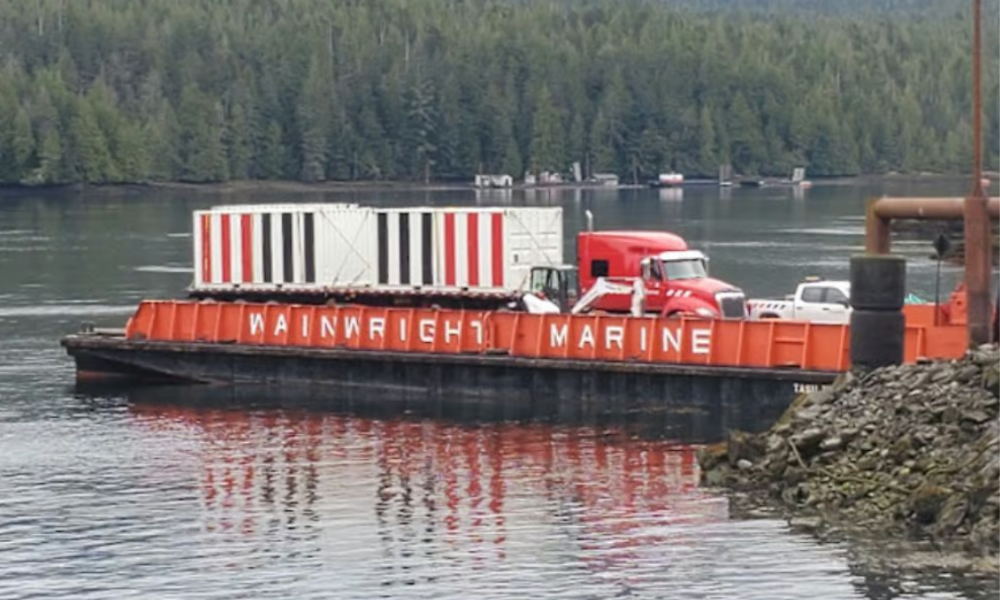Lawyer says money owed will go towards 'programs to prevent similar incidents'

The tugboat owners responsible for a fatal sinking near Kitimat, B.C., which claimed the lives of two individuals, have been ordered to pay $310,000 during a recent sentencing hearing in Prince Rupert, British Columbia. But instead of paying a typical fine, the judge has allowed for an alternate payment plan that would see the funds go to prevention programs.
The incident occurred on February 10, 2021, when the tugboat Ingenika sank in treacherous conditions while attempting to tow a loaded barge through the icy waters of the Gardner Canal.
Captain Troy Pearson, 58, and deckhand Charley Cragg, 25, lost their lives, while a third crew member, Zac Dolan, was rescued after spending hours in a life raft and subsequently hospitalized for hypothermia and frostbite.
James Geoffrey Bates pleaded guilty to one of eight charges under the occupational health and safety provisions of the Workers Compensation Act. Bates' company, Wainwright Marine, was also charged and pleaded guilty to three of the eight charges against it. The remaining charges against Wainwright Marine had previously been dropped by the Crown.
According to Graeme Hooper, associate counsel with Mitha Law Group, and a lawyer directly involved in the case, Judge Nina Purewal declared that if there were to be fines, Bates would be fined $15,000 and his company, Wainwright Marine, would be fined $295,000.
"However, the Workers Compensation Act requires that any fine be paid to WorkSafeBC. Instead, Crown and defence proposed to have the amount that would have been a fine be spent on programs to prevent similar incidents from occurring," explains Hooper. "The judge approved that plan. We are now working with industry more generally to identify what programs to allocate those funds to."
Bates will also perform 100 hours of community service. "He actually volunteered to do those hours because they were requested by the families, which the judge acknowledged at the hearing," says Hooper. "Ordinarily, community service hours would be suggested where the individual does not have the money to pay the fine. In this case, Mr. Bates wanted to do the hours out of respect for the wishes of the families."
The tragedy brought to light critical safety lapses, with reports indicating that Cragg had received no training on his first day on the job. The Transportation Safety Board revealed that Captain Pearson and Cragg drowned because their immersion suits were improperly fastened, allowing water to seep in, restricting their movement, and increasing the risk of hypothermia. The crew had also not practiced using safety equipment, which further contributed to the dire outcome.
Genevieve Cragg, Charley Cragg's mother, spoke with CBC News outside the courtroom, saying she is not satisfied with the sentences. "What I hold on to is that James Bates and Wainwright Marine admitted their guilt... So it's like a worker's life isn't as valuable as a passenger."
Judy Carlick Pearson, the widow of Captain Troy Pearson, shared the profound impact of the loss on her family, particularly her son. She expressed her hope that Bates would comprehend the extent of the pain caused to their families.
The decision to direct the funds to what Judge Purewal called a "more creative and restorative plan" that directs the fines towards a "meaningful cause" was approved by the Cragg and Pearson families.
The hearing was adjourned until January, allowing both parties time to identify programs the money will be allocated to.
Transport Canada had already imposed a fine of $52,000 on Wainwright Marine for its failure to ensure the vessel was adequately staffed and that crew members possessed the required certificates for their positions. Bates Properties, the parent company of Wainwright Marine, also incurred a $10,000 fine for its failure to ensure compliance with regulatory requirements.
In March, the Transportation Safety Board revealed the tugboat had been in operation for more than 50 years and it was never inspected by Transport Canada during that time.
The sentencing serves as a poignant reminder of the importance of prioritizing safety measures in maritime operations and the need for accountability when lives are lost due to lapses in workplace safety. It also demonstrates there are productive alternatives to punitive fines.





